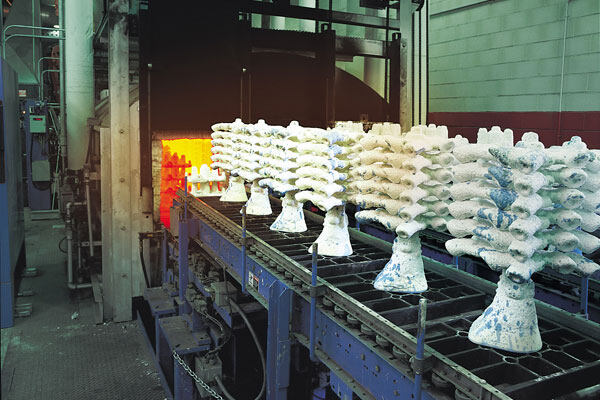Lỗi định dạng email
emailCannotEmpty
emailDoesExist
pwdLetterLimtTip
inconsistentPwd
pwdLetterLimtTip
inconsistentPwd

Tin tức
investment casting wax,carving wax for casting,wax for lost wax casting
The beauty of the investment casting wax is that it can make extremely complex and delicate metal products. So, do you know how these exquisite objects are formed? Today, let's learn about the beauty of lost wax casting craftsmanship!
The specific operation steps of carving wax for casting

✅Step 1: Mold making
The original clay model is crucial. First, use the mud to make the main shape of the pattern, including its radian, the size of the flared mouth, the width, and the thickness. These all rely on long-term practice and experience to master.
✅Step 2: Flip the mold
The original mold made of clay is coated with a layer of silicone, and then gauze is attached to the outside, and finally fixed with plaster. Then, the silicone is peeled off from the original mold, and the formed cavity is filled with melted paraffin, so that an identical wax mold can be obtained.
✅Step 3: Trim
Paraffin models taken from silicone models need to be finely trimmed. Since the process of turning the mold must be upside down on the platform, several paraffin models are required for the shapes with lids and ears, and they must be carefully glued and polished by hand during the modification. Fine finishing work can sometimes take a day.
✅Step 4: Carving
The finished paraffin model can be used for carving after a few days. Compared with gypsum, beeswax has good plasticity and is easy to process. The wax model can be carved more finely, and the hair of the lion, auspicious beast, etc. can be slowly combed and trimmed with a carving knife.
✅Step 5: Hanging sand
The ancient process was to finely coat the outside of the wax mold with moist clay and then apply thick layers of clay in preparation for the next step to form the cavity for pouring the bronze melt. The modern method is to first soak the wax mold in water glass solution. Water glass is also called Paohua alkali, and its chemical name is sodium metasilicate. Hang 5-6 layers of refractory materials on the outside, and even larger objects need to hang as many as 8-9 layers. After taking out, sprinkle quartz sand, put it in ammonium chloride solution to harden, and repeat the operation until a shell with sufficient strength of 5-10 mm is formed.
✅Step 6: Melt the wax
The mold shell is immersed in 80-95 degree water to remove the wax film, and then calcined to remove the residual wax to obtain a cavity mold shell. After the beeswax melts into a liquid when heated, it flows out of the pre-reserved small hole, and what remains is a hardened clay shell. At this time, the mold has changed from a solid mold to a hollow mold, and then the copper water can be poured.
✅Step 7: Cast copper water
Fill the outer shell with sand to increase strength and stability, and start casting. A hot bronze solution is poured into this clay shell, filling the space formerly occupied by beeswax.
In the past, Xuande furnaces were mostly made of brass and precious metals such as gold and silver. Today's copper smelting and purification technology is much more advanced than in ancient times. Xuande furnaces made in the art center are all cast with high-quality red copper. To avoid pores and trachoma, the ratio of copper and other metals is extremely important.
✅Step 8: Cool
Leave the cast copper furnace together with the refractory material for a period of time.
✅Step 9: Shelling
After the red copper solidifies and cools, smash the clay or the heavy refractory shell, and you can take out the exquisite copper casting that is exactly the same as the earliest beeswax model.
✅10: Cutting
The pores reserved in the process of melting wax are often cast with red copper. After breaking the thick shell, the excess red copper is cut off and smoothed.
✅Step 11: Sanding and Polishing
After repeated grinding and polishing, the copper furnace will emit a soft and bright luster from the inside out. Fine polishing is accompanied by the sound of sandpaper. Experienced masters need to be careful and grasp the strength. If you are not careful, the fine carvings obtained after dozens of processes may be turned into copper powder.
As the appeal says, the process of carving wax for casting is extremely tedious and delicate, so patience and care are very necessary. The perfect handicraft is formed by the appeal step by step. For more information about wax for lost wax casting, please feel free to contact us.

